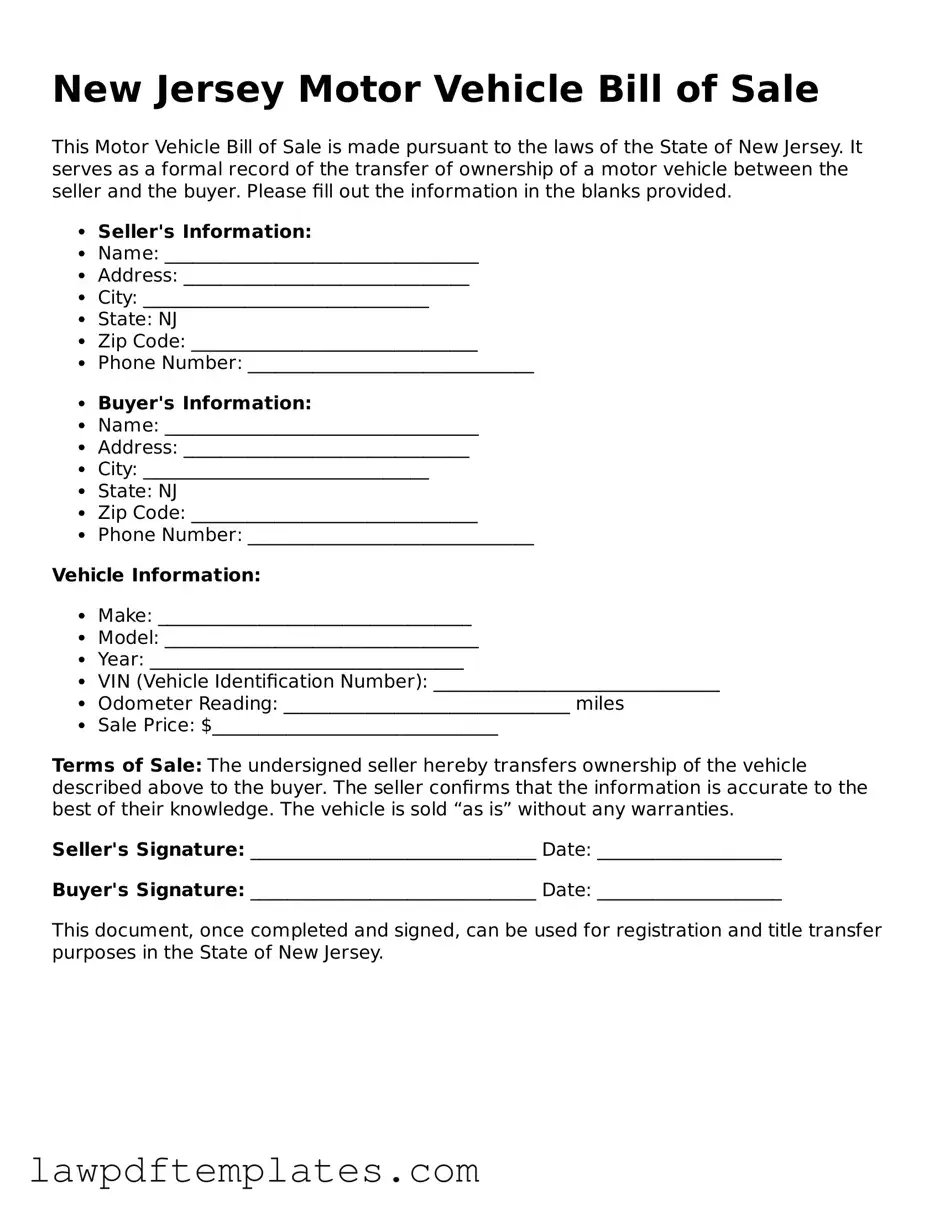Free Motor Vehicle Bill of Sale Template for the State of New Jersey
Form Breakdown
| Fact Name | Description |
|---|---|
| Purpose | The New Jersey Motor Vehicle Bill of Sale form serves as a legal document to transfer ownership of a vehicle from one party to another. |
| Governing Law | This form is governed by New Jersey Statutes Title 39, which pertains to motor vehicles and traffic regulations. |
| Required Information | The form must include the vehicle's make, model, year, VIN (Vehicle Identification Number), and odometer reading. |
| Seller's Information | The seller must provide their name, address, and signature to validate the sale. |
| Buyer's Information | The buyer's name and address are also required for proper documentation of the sale. |
| Date of Sale | The date when the transaction takes place must be clearly stated on the form. |
| Notarization | While notarization is not required, it is recommended to enhance the document's credibility. |
| Record Keeping | Both the buyer and seller should keep a copy of the completed Bill of Sale for their records. |
| Transfer of Title | The Bill of Sale is often used in conjunction with the title transfer process at the New Jersey Motor Vehicle Commission. |
| Legal Protection | This document provides legal protection for both parties in case of disputes regarding the sale. |
Sample - New Jersey Motor Vehicle Bill of Sale Form
New Jersey Motor Vehicle Bill of Sale
This Motor Vehicle Bill of Sale is made pursuant to the laws of the State of New Jersey. It serves as a formal record of the transfer of ownership of a motor vehicle between the seller and the buyer. Please fill out the information in the blanks provided.
- Seller's Information:
- Name: __________________________________
- Address: _______________________________
- City: _______________________________
- State: NJ
- Zip Code: _______________________________
- Phone Number: _______________________________
- Buyer's Information:
- Name: __________________________________
- Address: _______________________________
- City: _______________________________
- State: NJ
- Zip Code: _______________________________
- Phone Number: _______________________________
Vehicle Information:
- Make: __________________________________
- Model: __________________________________
- Year: __________________________________
- VIN (Vehicle Identification Number): _______________________________
- Odometer Reading: _______________________________ miles
- Sale Price: $_______________________________
Terms of Sale: The undersigned seller hereby transfers ownership of the vehicle described above to the buyer. The seller confirms that the information is accurate to the best of their knowledge. The vehicle is sold “as is” without any warranties.
Seller's Signature: _______________________________ Date: ____________________
Buyer's Signature: _______________________________ Date: ____________________
This document, once completed and signed, can be used for registration and title transfer purposes in the State of New Jersey.
Common mistakes
When completing the New Jersey Motor Vehicle Bill of Sale form, individuals often overlook key details that can lead to complications down the line. One common mistake is failing to include accurate vehicle information. The form requires specific details such as the vehicle identification number (VIN), make, model, and year. Omitting any of this information can result in delays during the registration process or even disputes over ownership.
Another frequent error involves the signatures of both the buyer and seller. It is essential that both parties sign the document to validate the transaction. Some individuals mistakenly assume that a signature from just one party suffices. Without both signatures, the Bill of Sale may not be considered legally binding, which can create issues if either party needs to prove ownership or if disputes arise later.
Additionally, people often neglect to provide the correct date of sale. This detail might seem trivial, but it serves as a crucial reference point for both parties. A missing or incorrect date can lead to confusion regarding the timeline of ownership and may affect the transfer of title. It is vital to ensure that the date accurately reflects when the transaction took place.
Lastly, many individuals fail to keep a copy of the completed Bill of Sale for their records. This document serves as proof of the transaction and can be invaluable in the event of future disputes or questions regarding ownership. Keeping a copy protects both the buyer and seller and ensures that each party has access to the necessary information should any issues arise later on.
Discover More Motor Vehicle Bill of Sale Templates for Specific States
Do I Need Bill of Sale to Transfer Title - Details any accessories or additional equipment included in the sale.
Understanding the role of a Durable Power of Attorney in your legal planning is crucial; for more information, refer to this guideline on Durable Power of Attorney forms.
Boat Bill of Sale Massachusetts - Encourages transparency and honesty in vehicle transactions.
Vehicle Bill of Sale Form - Serves as a receipt for the buyer after the sale.
What Should a Bill of Sale Look Like - A Motor Vehicle Bill of Sale can be written by the parties involved or sourced from online templates.
